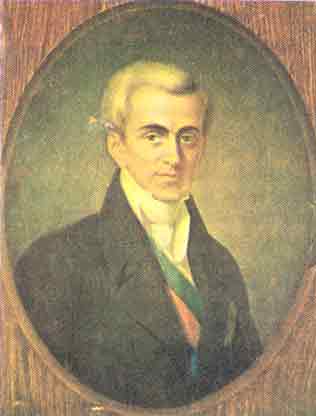People
Statesmen
Ioannis Kapodistrias (1776-1831)
Ioannis Kapodistrias {Ιωάννης Καποδίστριας} (1776-1831) [500 Drachmas] [€0.20c] [Society Of Friends] [Dimitrios Ipsilandis] [Theodoros Kolokotronis] [Aleksandros Mavrokordatos] [Athanasios Tsakalof] [Emmanouil Ksanthos] [Ioannis Makrigiannis] [Andreas Miaoulis] [Nikitaras] [Mando Mavrogenous] [Francois Maxim Raybaud] [Georgios Koundouriotis]. A leading politician and diplomat, who became the first Governor of Greece, after the 1821 Greek War of Independence against Ottoman rule. Since he worked hard for Greece's progress and appeared successful, he annoyed the establishment of the time that eventually murdered him.
Ioannis Kapodistrias was appointed Secretary of State for the Ionion Islands {Ionios Politia ~ Ιόνειος Πολιτεία} in 1803. When the French gained control of the Heptanese {Eptanisa ~ Επτάνησα}, he left for Russia where he was appointed Councillor of State, then Ambassador and finally Minister of Foreign Affairs to the Czar.
On April 14th, 1827, the National Assembly of Troizen {Trizin ~ Τροιζήν} elected him Governor of Greece and on January 13th, 1828, Kapodistrias arrived in Nafplion {Ναύπλιον} and set to work. He did everything in his power to put the administration in order, and bring order to the fledgeling country. During his term of office he put a council together and set up the "Panhellinion" {Πανελλήνιον}, an advisory body. Kapodistrias worked systematically and diligently.
He
founded a lot of educational establishments (primary schools, secondary schools and
colleges of education) museums, a library, an orphanage on Aegina {Αίγινα} for children whose
fathers' had been killled fighting for the Cause. He made provision for the army,
regulated recruitment, and founded the Hellenic
Army Academy ![]() . He organized the irregular
troops on the basis of eight-thousand-men groups and determined that officers and men
should be paid by the state so that the army would be a national army and would no longer
be controlled by war lords. He chased away the corsairs who had been plundering the Aegean
{Egeon ~ Αιγαίον}
islands and cleaned up Mainland Greece of Ottoman remnants.
. He organized the irregular
troops on the basis of eight-thousand-men groups and determined that officers and men
should be paid by the state so that the army would be a national army and would no longer
be controlled by war lords. He chased away the corsairs who had been plundering the Aegean
{Egeon ~ Αιγαίον}
islands and cleaned up Mainland Greece of Ottoman remnants.
Kapodistrias took a lively interest in agriculture and founded a farm school in Tirins {Τύρινς}, where he instigated the cultivation of potatoes. He conducted a national census and gave suffrage to all men aged 25 and over. He divided the country into administrative districts (prefectures). He founded the first post office [Hellenic Post], made provision for the health of the people and bolstered trade.
After donating his entire wealth to the state, he established a credit organization (bank) on Aegina and minted the "phoenix" {φοίνιξ}; that is, the coin bearing the phoenix emblem; the bird that rose from its ashes, just as Greece rose from the ashes of the War of Independence. Kapodistrias took care to rid the country of the pirates who had been operating from the Sporades {Σποράδες} islands. He ordered regulations to be drawn up for the merchant navy and founded shipyards on Poros {Πόρος} and in Nafplion.
In 1829 he had the first "National Road" (as he himself called it) built. It linked Methoni {Μεθώνη} and Pilos {Πύλος}. He implemented a legal code and put the first courts into operation with a system of tribunal Courts of the First Instance and 5 Appeal Courts.
Kapodistrias' policies upset many of the old community lords and old politicians, and also those who had fought for Independence. There were rebellions against him. Petrombeis Mavromihalis' [People] brother, Konstandinos {Κωνσταντίνος}, and his son George {Γεώργιος}, determined to get rid of Capodistrias and organized his assassination.
They attacked him on Sunday October 9th, 1831, (September 27th, by the Julian calendar [Calendars]) at 6 o'clock in the morning when he was on his way to mass at Saint Spyridon {Άγιος Σπυρίδων} Church in Nafplion. One shot him with a pistol while the other stabbed him in the stomach with a knife. The governor fell down dead. One of his assassins was murdered on the spot by Kapodistrias' attendants. The other was arrested, tried, convicted and shot.
Kapodistrias'
remains were buried on Corfu {Κέρκυρα},
his homeland. Two marble statues, one in Nafplion and one in front of the National and Kapodistrian University ![]() in Athens [Place Names],
honour his memory.
in Athens [Place Names],
honour his memory.
Ioannis Kapodistrias (1776-1831)

04-22-2004